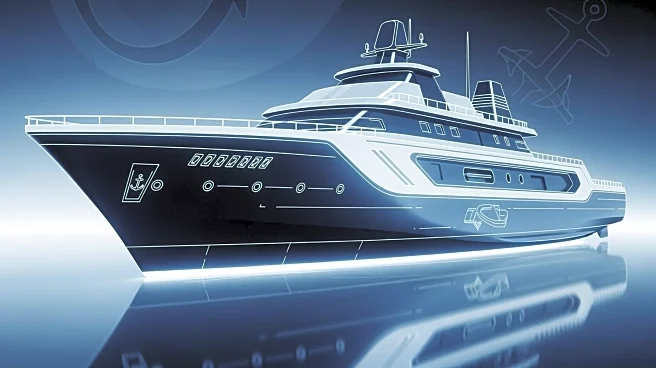What's Happening?
South Korean shipyards, HD Hyundai Heavy Industries and Hanwha Ocean, are proposing to assist the US Navy in overcoming its shipbuilding challenges. The US Navy is currently facing delays and budget overruns in its shipbuilding programs, as highlighted
by US Secretary of the Navy John Phelan during a House hearing. South Korean shipyards have demonstrated efficiency in constructing warships for their navy, and they are ready to share their technology and expertise with the US. Hanwha has already invested in the Philly Shipyard in Pennsylvania, planning to inject $5 billion into the facility for commercial and military projects. However, US laws currently prevent the Navy from purchasing foreign-built ships or constructing them abroad, posing a challenge to this collaboration.
Why It's Important?
The collaboration between South Korean shipyards and the US Navy could significantly impact the US shipbuilding industry. By adopting South Korean methods, the US could potentially reduce delays and budget overruns, enhancing its naval capabilities amid growing competition from China. This partnership could also lead to increased investment in US shipyards, boosting local employment and technological advancement. However, legislative changes would be necessary to facilitate this cooperation, which could face political hurdles. The efficiency and cost-effectiveness of South Korean shipbuilding could serve as a model for revitalizing the US industry.
What's Next?
For the collaboration to proceed, changes in US legislation would be required to allow foreign-built ships or construction abroad. This would involve discussions between Congress and the Trump administration to amend existing laws. Additionally, the partnership could lead to further investments in US shipyards, potentially transforming the industry. The success of this collaboration could also influence future international partnerships in defense manufacturing, setting a precedent for cross-border cooperation in military technology.
Beyond the Headlines
The potential collaboration raises questions about the balance between national security and economic efficiency. While foreign partnerships could enhance technological capabilities, they also pose risks related to dependency on external entities for critical defense infrastructure. Moreover, the initiative could spark debates on the protection of domestic industries versus the benefits of globalization in defense manufacturing. The outcome of this collaboration could influence future policy decisions regarding international cooperation in defense technology.
















